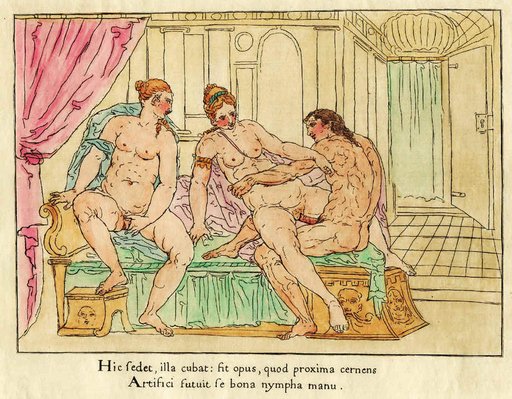January 22nd, 2013 -- by Bacchus
Classical Three-Way
Neither my Latin nor Google Translate’s is up to providing a good unambiguous translation of the caption on this classical bit of sex art:

The caption reads:
Hic fedet, illa cubat: fit opus, quod proxima cernens
Artifici futuit fe bona nympha manu.
Similar Sex Blogging:
This entry was posted on Tuesday, January 22nd, 2013 at 2:07 pm. You can follow any responses to this entry through the RSS 2.0 feed. You can leave a response, or trackback from your own site.
Shorter URL for sharing: https://www.erosblog.com/?p=9250
Shorter URL for sharing: https://www.erosblog.com/?p=9250








Some of the “f” looking letters are “s”s, English used to do that for a leading “s” on words.
Hic sedet, illa cubat: sit opus, quod proxima cernens
Artifici futuit se bona nympha manu.
Which google translates:
Here he is sitting, her in his arms: it is a work, which is very near, seeing
Skillful nymph fucks herself good hand.
This is the translation me and my bf came up with:
“Here he is sitting, her in his arms: it is a work of art.
Nearby, seeing this, she fucks her hand well [masturbates].”
“He sits, she reclines: this work, which the nearest woman discerning /
The good dextrous nymph fucks herself with her hand.”
—
Technical stuff:
There are a few errors of translation which an expert would correct. “Quod” could be a pronoun or a conjunction. It could mean something like because, but “which” works too.
I didn’t know quite how to translate “cernens” without possibly betraying the sense. “proxima” likely refers to the third woman (the nearest woman).
“Artificium” can mean skilled at a craft. It can also mean dextrous, which seems to apply. It’s technically a genitive I think, but seems to describe the nymph nonetheless.
“futuo” is a pretty rare verb. I had to look that one up.
The last translation is a good one, except that “artifici” is actually an ablative modifying “manu”. The translation would be “she fucks herself with her skilled hand”.
“Quod” might also be a relative pronoun, referring back to “opus” and the direct object of “cernens”, although it could be a conjunction meaning “because” too. It is somewhat ambiguous here, which is common in Latin poetry (the two lines are an elegiac couplet).
Also, “proxima” modifies “nympha”, i.e, “the nearest nymph”.
My translation would be:
This one (the man: hic) sits, that one (the woman: illa) reclines: a labor (opus: can also mean “work”) comes about (fit) because the good nymph, being nearest, while watching, fucks herself with her skilled hand.
Something is nearly always lost when attempting a translation from one language to another, but basically I think the idea is: “As one woman reclines in his skillful embrace, another sits nearby pleasuring herself as she watches.”
I am always amazed when a straightforward translation — even from a language so widely known and well-connected to our own — proves so elusive. Thanks to everyone for the translations! The sense of it becomes clear, at least.’
Here’s one more effort, sent to me by a classicist who was too shy to post it directly:
============================
“This man sits, that woman lies back; the act may be accomplished since he is seeing a nymph nearby fuck herself with her skillful hand.”
More idiomatically:
“He sits while she reclines; the deed is done while he sees a nearby nymph fuck herself with her skillful finger.”
This is a repost (with permission) of part of an email from “V”:
==========
The Latin appears to have been derived from a collection of erotic poems written to or about Priapus, the Greek/Roman fertility god (http://en.wikip...iapus). Google books appears to have the collection in its entirety: http://books.go...XnXK6
You’ll find the lines on page 182 of the book. Specifically, it looks like verse 12 of a 15-verse sonnet authored in 1710 by “Bernardus Lamonnoye,” who is likely Bernard de la Monnoye (https://en.wikipedia.org/wiki/Bernard_de_la_Monnoye), a 17th/18th century French lawyer/poet. The sonnet is the Aretini Carminum (the poem of Petro Aretino, the lucky fellow in the graphic depiction, no doubt (petro is descriptive, meaning something like a young breeding ram)).
=====
Thanks, V!